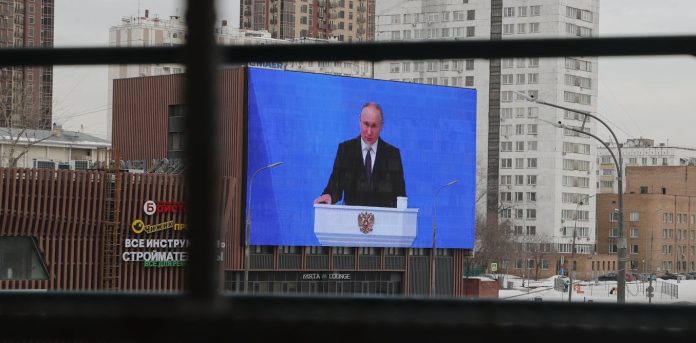How conspiracy theories help to maintain Vladimir Putin’s grip on power in Russia
By Gemma Ware, The Conversation
As Russians head to the polls on March 15 for the presidential election, conspiracy theories are swirling everywhere. In this episode of The Conversation Weekly podcast, we speak to a disinformation expert about the central role these theories play in Vladimir Putin’s Russia.
As soon as the death of Russian opposition figure Alexei Navalny in a Siberian penal colony was announced in February, conspiracy theories about who was behind it began circulating in Russia.
“That he was killed by his puppet masters from the west, not the Kremlin. That he was killed by them because his murder would actually make Putin look awful in the eyes of global community,” explains Ilya Yablokov, a lecturer in digital journalism and disinformation at the University of Sheffield in the UK.
Yablokov studies the spread of conspiracy theories in post-Soviet Russia, and says the stories about Navalny are the most prominent of many circulating ahead of a presidential election that looks certain to keep Putin in the Kremlin until at least 2030.
Yablokov tells The Conversation Weekly that Russia’s conspiracy culture has become a key tool for Putin’s regime: “Conspiracy theories are one of the few ways of keeping the society together and to prevent the change of the regime.”
Fear of anti-Russian conspiracy now informs many pieces of domestic legislation, such as the 2022 changes to the criminal code that were aimed at censoring criticism of the Russian military, and in particular its actions in Ukraine. Yablokov adds:
Every possible activity that can shake up the regime and question its actions is forbidden on the grounds of an existing conspiracy against Russia and its regime.
Conspiracy theories used to exist on the margins of Russian culture. Putin typically avoided mentioning them too much, except at key political moments such as elections or Russia’s 2014 annexation of Crimea. But now, and in particular since the Ukraine war, they have moved to the centre of political debate.
Listen to The Conversation Weekly podcast to hear Ilya Yablokov talk about Putin’s changing relationship with conspiracy theories, plus an introduction from Grégory Rayko, international editor at The Conversation in France.
A transcript of this episode will be available shortly.
This episode of The Conversation Weekly was written and produced by Gemma Ware and Katie Flood, with assistance from Mend Mariwany. Sound design was by Eloise Stevens, and our theme music is by Neeta Sarl. Stephen Khan is our global executive editor, Alice Mason runs our social media and Soraya Nandy does our transcripts.
Newsclips in this episode were from Russia Media Monitor, BBC News, Guardian News, NBC News, CBS Mornings and Channel 4 News.
You can find us on Instagram at theconversationdotcom or via email. You can also subscribe to The Conversation’s free daily email here.
Listen to The Conversation Weekly via any of the apps listed above, download it directly via our RSS feed or find out how else to listen here.![]()
Gemma Ware, Editor and Co-Host, The Conversation Weekly Podcast, The Conversation
This article is republished from The Conversation under a Creative Commons license. Read the original article.



